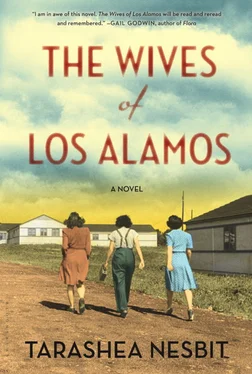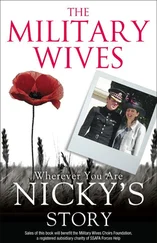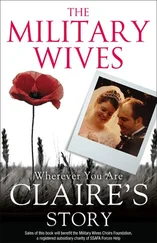WHAT ELSE WERE we? Energetic, disheveled, determined, and disagreeable. After teasing our friends’ husbands about their politics—either they were too sympathetic of communism, or they were too trusting of capitalism—a flash of anger would cross their faces and they would tell us we were quite the character .
WHEN HE LEARNED that the Fuller lodge was built by Michigan investors as a resort area but no one wanted to vacation here, we were not surprised. Instead the vacation homes with bathtubs became sleeping quarters for the Los Alamos Boys’ School, a place designed to help harden the young boys of elite East Coast and Midwestern families. All those boys sent to the Southwest to be toughened up: boys who would go on to be presidents of Sears, American Motors, Quaker Oats, who would become the owners of the Chicago White Sox, who would become famous writers of the sixties counterculture. This location of hardening was now ours.
BATHTUB ROW, LOUISE deemed those older homes. Those houses were made not with tin and drywall but with stone and hardwood, and also had a claw foot tub, when all we had was a stall shower lined with zinc. Those women—the Director’s wife, three women who were also scientists, others who were somehow considered favorites—took baths that most of us could not, those women got a good soak, those women, we told one another, had maid service more frequently than we did. Those women, those women . And if our husbands told the Housing Office they needed a bathtub to get new ideas, it was still no use. Our status symbol was who had a bathtub, even though there was rarely enough water to fill it. Because of the water situation, the most impolite thing we could do was flush another woman’s toilet. Some of us, the spiteful ones, would use another woman’s restroom and exclaim, Oh my, I can’t believe I forgot! but no one believed them. When we ran out of water, we wore kerchiefs on our heads, or refused to leave the house. And many of us chortled at the wives who would not socialize on account of their dirty hair.
WHEN THE WATER came out of the faucet it often came out brown, sometimes as thick as mud. We were told to take good citizen showers , to soap up and then turn on the shower. Many times we got prepared for a good citizen shower and the water never appeared. And our bodies were left cold, soapy, and sticky and we never took a good citizen shower again.
BY LATE SEPTEMBER we got news that though Italy had surrendered to the Allies, German paratroopers had rescued Mussolini and now the Germans occupied Rome, with Mussolini, some said, serving only as the figurehead. Our hopefulness of getting out soon was gone. The dry air cracked our lips and Katherine swore she gained a new wrinkle each month because of it. We applied thick cold cream that made our foreheads shiny and our faces smell like, according to our husbands, rotting flowers , and we had to choose between our husbands’ noses and our future faces.
IN THE DAY we wore gingham, at night we wore our prewar silk stockings, our prewar silk dresses. If we were the same proportions and lived close to one another we swapped clothes to make our own wardrobes appear more extensive. We admired Starla’s purple felt swagger brim hat, Louise’s ruby feather skimmer, Helen’s red-checkered skirt, and Margaret’s canary yellow scarf. We had not accounted for the harsh high desert nights and for the first weeks we were cold in our cotton. In the chilly evenings we envied Ingrid’s wool cardigan in blush, which we were unable to buy ourselves due to the rationing. And, we could not believe it, but we even envied—on days we carried two armfuls of groceries home after the sun went down—the Army’s bulky drab-colored coats.
MANY OF US hated the women scientists. And the women scientists hated us, or they had better things to worry about. We tried to be their friends. We invited one of them to lunch but she was busy. We despised what she knew and how she laughed at our questions. How she went on hikes with our husbands without us. How she carried herself with the knowledge of things we did not know.
THEREFORE, A FEW of us flirted with her husband, another scientist, at cocktail parties, after he had two drinks, while she was in the restroom; we flirted until we thought we could have him if we chose, and we winked at her when she returned to the conversation.
OR WE TRIED to keep our enemies closer than our friends. We brought over corn bread. We asked about her daughter, who was homesick, or her son, who was getting in trouble at school. We offered to make soup. We listened.
OR WE HAD little patience for petty competitions for power among women. We were preoccupied instead with the fate of Europe, and with our husbands and other scientists and their wives we talked about the war, Germany, and the suffering the Nazis were bringing into the world.
WE DID NOT all agree about the women scientists. Margaret thought Joan Hinton was nice enough, even though most of us said to one another, Joan Hinton needs to pull down her skirt and stop flirting with Frank . Frank was Louise’s husband. Oh, Frank . There was something refined about him, even in the summer with his shirt off, under a car, or playing the guitar. We could tell by how our husbands held their heads when speaking to him that he was respected, even if we did not know exactly what he did. And Frank, unlike our husbands, never seemed fettered, never seemed as if the pressure of this town, or this war, got to him. We, too, lingered on Frank.
From Fields, from Concrete
WE WERE WARNED by our mothers, our grandmothers, our uncles, our fathers, our priests, and our rabbis not to marry them before the war was over; they worried we were making a hasty decision; they thought time would change our minds. Our fiancés were men they did not like, or they loved the men we chose but they thought we were too young, or they wanted us to finish college first. And when we did marry them we were told, Well, Virginia, you’ll need a broom and a dustpan. Perhaps we did not marry our first loves—men who in our memory were reduced to caricature—the athlete, the class clown. We married the scientists instead, men with thick heads and scrawny bodies. Or we had always loved the scholarly ones most of all.
OUR HUSBANDS CAME from small towns, from large cities, from fields, from concrete. We met them on boardwalks in Atlantic City, on football fields in Iowa, at cafés in Berlin, at scientific meetings in Moscow. They were disqualified for the draft due to rheumatic fever as a child, diabetes, being overweight, being underweight, asthma, deafness, or poor eyesight. They spoke several languages, they were aggressive at sports, they loped across the street, they shined with knowledge. They thought we were beautiful, they thought we were smart, they thought we had soft breasts, they thought we would make good mothers.
WE MARRIED THEM weeks or months after Pearl Harbor—in spring, summer, fall, and winter—when our West Coast hometowns were declared to be in a state of emergency and all citizens had a curfew of ten o’clock. We wore smart white suits, or dresses our mothers made, or dresses we bought in Milan or Paris. We were married in parks, in churches, in synagogues, and in courthouses with our sisters, our mothers, our fathers, and our friends. We were married in the presence of neighbors, distant family members, our mother’s bridge partners—people we were obligated to invite though we did not really like them.
IN THE AIR was the threat of every man leaving, of every man being a hero, of every eligible bachelor dying—these threats made our fiancés more desirable to us, our love more urgent. We were ready to decide something very large about our futures.
Читать дальше












